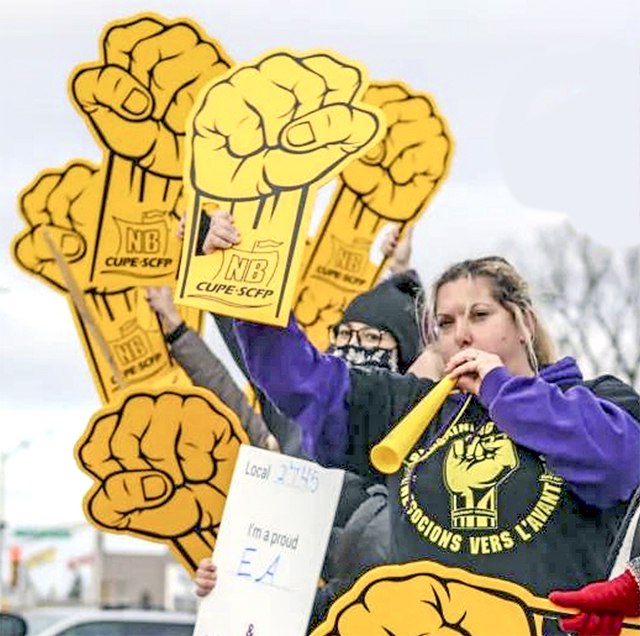WALKING TALL
Twenty-two thousand CUPE N.B. members walkout for fair pay

THE UNION REFUSED TO KNUCKLE UNDER. It’s not what unions are set up to do after all. And they didn’t. They exercised their legal right to strike.
On October 29, the 22,000 members of CUPE (Canadian Union of Public Employees) N.B. acted on their right to stop going in to work.
Lockouts
The walkout forced the closure of schools across the province.
On Sunday, October 31, the Higgs government locked out 3000 members of CUPE 1253 and 2745, locals representing a range of education workers from educational assistants to custodians and bus drivers.
The union called the move a clear attempt by the government to divide the union against itself and “create chaos”.
Also on Sunday, the government laid off all the CUPE educational workers previously deemed essential.
CUPE local 2745 immediately filed a complaint with the Labour Board. The board quickly ruled against the government layoff action.
A threat of back to work legislation

On November 1, Premier Blaine Higgs cancelled his scheduled Throne Speech in order to clear the way for pushing through back to work legislation. Higgs said he could use the province’s Emergency Measures Act to force the employees back to work.
Meanwhile, the workers and their supporters picketed many towns, cities and MPP constituency offices all across New Brunswick.
Mediated negotiations between the union’s centralized bargaining team and the provincial government ended on October 26, when the employer left the table.
“This employer has walked away from the table when we had come and were being extremely collaborative, respectful and certainly had moved off our original offers,” said CUPE N.B. president Steve Drost.
CUPE offers to accept less
CUPE had offered to reduce its ask to a 3% wage increase a year for four years, down from an original ask of 5% a year for four years,
The government countered with an offer of a 1.7 % a year wage increase for five years.
Drost says the province has offered significantly higher increases to other unions.
Drost points out most CUPE N.B. members haven’t had a proper raise in 15 years and remain among the lowest paid workers in the country.
Drost said it would be “unfortunate” if the government orders the strikers back to work. “Any type of legislation like that would certainly be an overreach and misuse of power,” he said. “It’s totally unnecessary.”
Government has the money
The province recently announced a $409-million surplus for 2020-21 and projected a $38-million surplus for the current fiscal year. CUPE calculates its requested pay increase would amount to barely over one per cent of the province’s annual budget.
“We’re living in a time of major government spending and major government intervention. So I don’t know if Higgs can win on the argument that we can’t keep paying people,” said J.P. Lewis, a professor of political science at the University of New Brunswick in Saint John. “That does not seem to be the political argument of the day.”
The CUPE N.B. struggle continues, as of this writing on November 2, with a planned mass march and rally at the N.B. legislature.
- 30 -













Add new comment